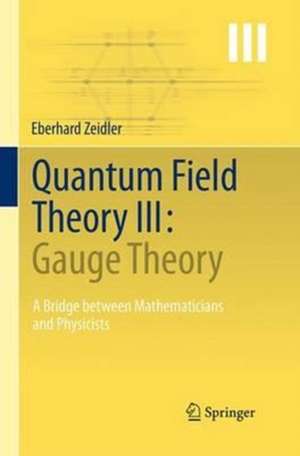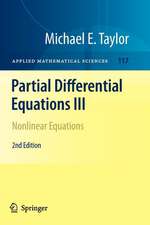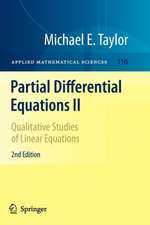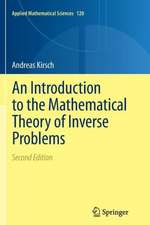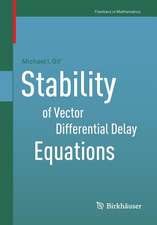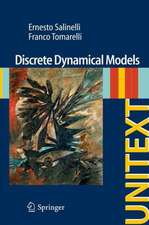Quantum Field Theory III: Gauge Theory: A Bridge between Mathematicians and Physicists
Autor Eberhard Zeidleren Limba Engleză Paperback – 23 aug 2016
Volume III concentrates on the classical aspects of gauge theory, describing the four fundamental forces by the curvature of appropriate fiber bundles. This must be supplemented by the crucial, but elusive quantization procedure.
The book is arranged in four sections, devoted to realizing the universal principle force equals curvature:
Part I: The Euclidean Manifold as a Paradigm
Part II: Ariadne's Thread in Gauge Theory
Part III: Einstein's Theory of Special Relativity
Part IV: Ariadne's Thread in Cohomology
For students of mathematics the book is designed to demonstrate that detailed knowledge of the physical background helps to reveal interesting interrelationships among diverse mathematical topics. Physics students will be exposed to a fairly advanced mathematics, beyond the level covered in the typical physics curriculum.
Quantum Field Theory builds a bridge between mathematicians and physicists, based on challenging questions about the fundamental forces in the universe (macrocosmos), and in the world of elementary particles (microcosmos).
| Toate formatele și edițiile | Preț | Express |
|---|---|---|
| Paperback (1) | 1280.96 lei 38-44 zile | |
| Springer Berlin, Heidelberg – 23 aug 2016 | 1280.96 lei 38-44 zile | |
| Hardback (1) | 1595.87 lei 6-8 săpt. | |
| Springer Berlin, Heidelberg – 17 aug 2011 | 1595.87 lei 6-8 săpt. |
Preț: 1280.96 lei
Preț vechi: 1685.47 lei
-24% Nou
Puncte Express: 1921
Preț estimativ în valută:
245.11€ • 267.08$ • 206.54£
245.11€ • 267.08$ • 206.54£
Carte tipărită la comandă
Livrare economică 19-25 aprilie
Preluare comenzi: 021 569.72.76
Specificații
ISBN-13: 9783662505953
ISBN-10: 3662505959
Pagini: 1126
Ilustrații: XXXII, 1126 p.
Dimensiuni: 155 x 235 mm
Greutate: 2 kg
Ediția:Softcover reprint of the original 1st ed. 2011
Editura: Springer Berlin, Heidelberg
Colecția Springer
Locul publicării:Berlin, Heidelberg, Germany
ISBN-10: 3662505959
Pagini: 1126
Ilustrații: XXXII, 1126 p.
Dimensiuni: 155 x 235 mm
Greutate: 2 kg
Ediția:Softcover reprint of the original 1st ed. 2011
Editura: Springer Berlin, Heidelberg
Colecția Springer
Locul publicării:Berlin, Heidelberg, Germany
Cuprins
Prologue.- Part I. The Euclidean Manifold as a Paradigm: 1. The Euclidean Space E3 (Hilbert Space and Lie Algebra Structure).- 2. Algebras and Duality (Tensor Algebra, Grassmann Algebra, Cli_ord Algebra, Lie Algebra).- 3. Representations of Symmetries in Mathematics and Physics.- 4. The Euclidean Manifold E3.- 5. The Lie Group U(1) as a Paradigm in Harmonic Analysis and Geometry.- 6. Infinitesimal Rotations and Constraints in Physics.- 7. Rotations, Quaternions, the Universal Covering Group, and the Electron Spin.- 8. Changing Observers - A Glance at Invariant Theory Based on the Principle of the Correct Index Picture.- 9. Applications of Invariant Theory to the Rotation Group.- 10. Temperature Fields on the Euclidean Manifold E3.- 11. Velocity Vector Fields on the Euclidean Manifold E3.- 12. Covector Fields and Cartan's Exterior Differential - the Beauty of Differential Forms.- Part II. Ariadne's Thread in Gauge Theory: 13. The Commutative Weyl U(1)-Gauge Theory and the Electromagnetic Field.- 14. Symmetry Breaking.- 15. The Noncommutative Yang{Mills SU(N)-Gauge Theory.- 16. Cocycles and Observers.- 17. The Axiomatic Geometric Approach to Bundles.- Part III. Einstein's Theory of Special Relativity: 18. Inertial Systems and Einstein's Principle of Special Relativity.- 19. The Relativistic Invariance of the Maxwell Equations.- 20. The Relativistic Invariance of the Dirac Equation and the Electron Spin.- Part IV. Ariadne's Thread in Cohomology: 21. The Language of Exact Sequences.- 22. Electrical Circuits as a Paradigm in Homology and Cohomology.- 23. The Electromagnetic Field and the de Rham Cohomology.- Appendix.- Epilogue.- References.- List of Symbols.- Index
Recenzii
From the reviews:
“This book is the third volume of a complete exposition of the important mathematical methods used in modern quantum field theory. It presents the very basic formalism, important results, and the most recent advances emphasizing the applications to gauge theory. … the book’s greatest strength is Zeidler’s zeal to help students understand fundamental mathematics better. I thus find the book extremely useful since it signifies the role of mathematics for the road to reality … .” (Gert Roepstorff, Zentralblatt MATH, Vol. 1228, 2012)
“The present book is a good companion to the literature on the subject of the volume title, especially for those already familiar with it. … the book touches upon a large number of subjects on the interface between mathematics and physics, providing a good overview of gauge theory in both fields. It contains lots of background material, many historical remarks, and an extensive bibliography that helps the interested reader to continue his or her more thorough studies elsewhere.” (Walter D. van Suijlekom, Mathematical Reviews, Issue 2012 m)
“This book is the third volume of a complete exposition of the important mathematical methods used in modern quantum field theory. It presents the very basic formalism, important results, and the most recent advances emphasizing the applications to gauge theory. … the book’s greatest strength is Zeidler’s zeal to help students understand fundamental mathematics better. I thus find the book extremely useful since it signifies the role of mathematics for the road to reality … .” (Gert Roepstorff, Zentralblatt MATH, Vol. 1228, 2012)
“The present book is a good companion to the literature on the subject of the volume title, especially for those already familiar with it. … the book touches upon a large number of subjects on the interface between mathematics and physics, providing a good overview of gauge theory in both fields. It contains lots of background material, many historical remarks, and an extensive bibliography that helps the interested reader to continue his or her more thorough studies elsewhere.” (Walter D. van Suijlekom, Mathematical Reviews, Issue 2012 m)
Notă biografică
The author is a retired director of the Max Planck Institute for Mathematics in the Sciences, Leipzig (Germany). He is a member of the German National Academy of Sciences, Leopoldina.
Textul de pe ultima copertă
In this third volume of his modern introduction to quantum field theory, Eberhard Zeidler examines the mathematical and physical aspects of gauge theory as a principle tool for describing the four fundamental forces which act in the universe: gravitative, electromagnetic, weak interaction and strong interaction.
Volume III concentrates on the classical aspects of gauge theory, describing the four fundamental forces by the curvature of appropriate fiber bundles. This must be supplemented by the crucial, but elusive quantization procedure.
The book is arranged in four sections, devoted to realizing the universal principle force equals curvature:
Part I: The Euclidean Manifold as a Paradigm
Part II: Ariadne's Thread in Gauge Theory
Part III: Einstein's Theory of Special Relativity
Part IV: Ariadne's Thread in Cohomology
For students of mathematics the book is designed to demonstrate that detailed knowledge of the physical background helps to reveal interesting interrelationships among diverse mathematical topics. Physics students will be exposed to a fairly advanced mathematics, beyond the level covered in the typical physics curriculum.
Quantum Field Theory builds a bridge between mathematicians and physicists, based on challenging questions about the fundamental forces in the universe (macrocosmos), and in the world of elementary particles (microcosmos).
Volume III concentrates on the classical aspects of gauge theory, describing the four fundamental forces by the curvature of appropriate fiber bundles. This must be supplemented by the crucial, but elusive quantization procedure.
The book is arranged in four sections, devoted to realizing the universal principle force equals curvature:
Part I: The Euclidean Manifold as a Paradigm
Part II: Ariadne's Thread in Gauge Theory
Part III: Einstein's Theory of Special Relativity
Part IV: Ariadne's Thread in Cohomology
For students of mathematics the book is designed to demonstrate that detailed knowledge of the physical background helps to reveal interesting interrelationships among diverse mathematical topics. Physics students will be exposed to a fairly advanced mathematics, beyond the level covered in the typical physics curriculum.
Quantum Field Theory builds a bridge between mathematicians and physicists, based on challenging questions about the fundamental forces in the universe (macrocosmos), and in the world of elementary particles (microcosmos).
Caracteristici
A bridge between mathematicians and physicists
A bridge from classic mathematics and physics to modern mathematics and physics
Includes supplementary material: sn.pub/extras
A bridge from classic mathematics and physics to modern mathematics and physics
Includes supplementary material: sn.pub/extras
